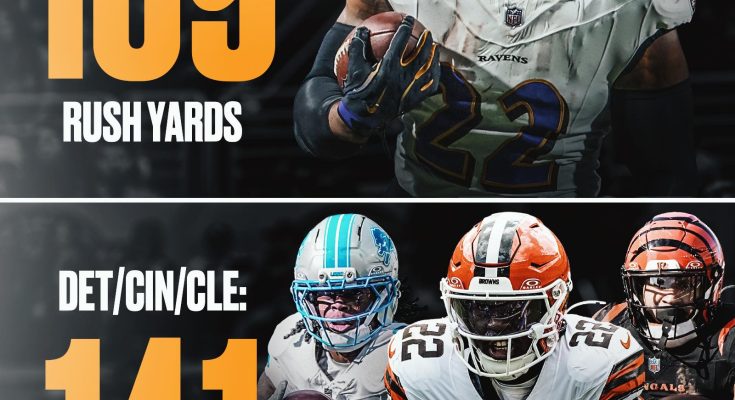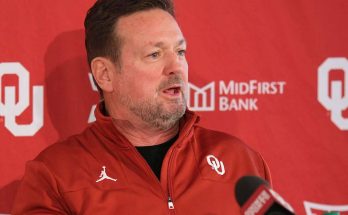Derrick Henry continues to redefine what it means to be a dominant running back in today’s NFL, and his latest performance serves as a stark reminder that even in a league heavily leaning toward aerial attacks, an elite ground game can still dictate the outcome. In Week 1 of the 2025 NFL season, Henry exploded for 169 rushing yards against the Buffalo Bills, averaging a staggering 9.4 yards per carry. His output alone eclipsed the combined rushing totals of three teams: the Detroit Lions, Cincinnati Bengals, and Cleveland Browns. All three squads—each with playoff aspirations and talented rosters—were held to just 46, 46, and 49 yards respectively. That’s a combined 141 rushing yards, which Henry surpassed on his own. It’s performances like these that remind fans, analysts, and opponents why he’s called “King Henry.”
What makes this feat even more remarkable is the context surrounding it. Derrick Henry joined the Baltimore Ravens in the offseason, pairing with Lamar Jackson to form what many predicted would be one of the most terrifying backfields in the NFL. Still, skeptics questioned how much Henry had left in the tank, given his age and the brutal wear and tear he’s endured from years of being the focal point of an offense in Tennessee. After all, running backs tend to decline quickly in their late 20s and early 30s. But Week 1 showed that Henry isn’t just fighting against the clock—he’s defying it entirely.
Against a physical Bills defense that’s typically stout up front, Henry didn’t just gain yards—he dominated. His 9.4 yards per carry average wasn’t the result of one fluke run either. It was a sustained, systematic punishment of Buffalo’s defensive front. He showed his trademark blend of power, vision, and deceptive speed, bouncing off tacklers, stiff-arming defenders into the turf, and hitting the second level with ease. And every time he touched the ball, the threat of a big gain loomed. The Ravens’ offensive line deserves credit for consistently creating holes, but what Henry did once he got to the second level was pure artistry.
Comparing Henry’s performance to that of entire NFL teams isn’t just about highlighting his dominance—it also underlines a league-wide trend. The Lions, Bengals, and Browns are not bottom-tier offenses. Detroit has one of the most balanced offensive units in the NFL, featuring a top-tier offensive line and the versatile Jahmyr Gibbs. Cincinnati, with Joe Mixon gone but a backfield-by-committee approach still in play, struggled to get anything going on the ground. And Cleveland—despite a backfield led by Jerome Ford and a team that typically leans on the run—was stymied in its opener. Whether it was game script, poor offensive line play, or stout defenses, each of these teams fell short of even matching Henry’s total.
That’s the incredible part of Derrick Henry’s impact. In an era where elite wide receivers dominate headlines and quarterback play is under a constant microscope, Henry remains one of the few running backs capable of singlehandedly tilting the field. His performance wasn’t just statistically superior—it was a statement. It said: I’m still the most feared runner in football.
One could argue that Henry benefits from playing alongside Lamar Jackson. Defenses can’t simply load the box without the threat of Lamar taking off on any given play. But while the partnership creates opportunities, Henry’s production isn’t a byproduct of scheme alone. The 9.4 yards per carry wasn’t built on trickery or misdirection. It was the result of pure dominance. Even when the Bills knew he was getting the ball, they couldn’t stop him. That’s what makes a performance like this so exceptional. It wasn’t just explosive—it was inevitable.
The Ravens’ decision to bring in Henry may already be paying massive dividends. Baltimore has long built its offensive identity around a punishing ground game, and the addition of Henry seems to elevate that ethos to a whole new level. With Jackson keeping defenses honest and Henry punishing them for even slight mistakes, it’s a nightmare scenario for defensive coordinators. You stack the box, and Lamar beats you through the air or with his legs. You play disciplined zone coverage, and Henry plows right through the heart of your defense. It’s pick your poison, and both options are lethal.
Beyond the raw stats and comparisons, Henry’s Week 1 performance serves as an emotional and psychological blow to opposing defenses. For defenders, tackling Derrick Henry in the first quarter is tough. By the fourth quarter, it’s demoralizing. He wears you down mentally and physically. His runs aren’t just about yardage—they’re about momentum, control, and attitude. When Henry is going strong, the entire offense feeds off it. Play-action becomes more effective. Defenses hesitate. Tackling fundamentals break down. The team builds rhythm and confidence, and the opponent starts to wilt.
When you consider that Henry did this against a playoff-caliber defense in Buffalo, it only amplifies the feat. The Bills may not be the top defense in the league, but they are by no means a soft unit. They’ve invested heavily in their front seven, and they have one of the most experienced coaching staffs in football. But nothing they tried could stop Henry from doing what he does best—take over games. And that’s something that can’t be overstated. Some running backs need perfect blocking, favorable matchups, and a lead to be effective. Henry doesn’t. He creates his own success. He manufactures yards after contact like few ever have. He breaks tackles not just with force, but with balance, leverage, and an unrelenting motor.
It’s also worth noting what this type of performance means for the Ravens’ long-term outlook this season. If Henry can maintain even a fraction of this level of dominance, Baltimore becomes arguably the most balanced offense in the league. They don’t need Lamar to be a superhero on every snap. They can manage the clock, dominate time of possession, and control games with their ground attack. That’s the kind of strategy that plays well in December and January. And Henry, with his playoff experience and physical style, is built for those cold-weather, smashmouth games that define the postseason.
On a historical note, Henry’s career has been full of such outlier performances, but this one feels especially symbolic. It’s his first game in a new uniform after years of carrying the Titans. He’s entering a new phase of his career, but he’s not looking to fade into the background—he’s making it clear that he still belongs in the conversation for best running back in football. And he’s doing it in a way that transcends stats. The eye test tells you everything you need to know. Henry still looks like the most physically imposing player on the field. He still has that rare ability to shift the emotional tone of a game with a single run.
If this performance is any indication of what’s to come, NFL defenses are in for a long season. The Ravens finally have a true workhorse to pair with their electric quarterback, and the early results suggest that this combination could be devastating. Baltimore doesn’t need Henry to do this every week—but the fact that he still can is a weapon in itself.
Ultimately, this is what greatness looks like. When one player outproduces entire teams—teams with highly paid players, elite coaches, and playoff ambitions—it says something profound about their place in the sport. Derrick Henry didn’t just have a great game—he reminded everyone that he’s still one of one. In a league that constantly moves on from running backs, that overlooks their contributions and diminishes their value, Henry remains a force of nature. And as long as he’s healthy and hungry, there’s no reason to think that won’t continue. Week 1 was just the opening statement. The King has arrived in Baltimore, and he’s not slowing down.



